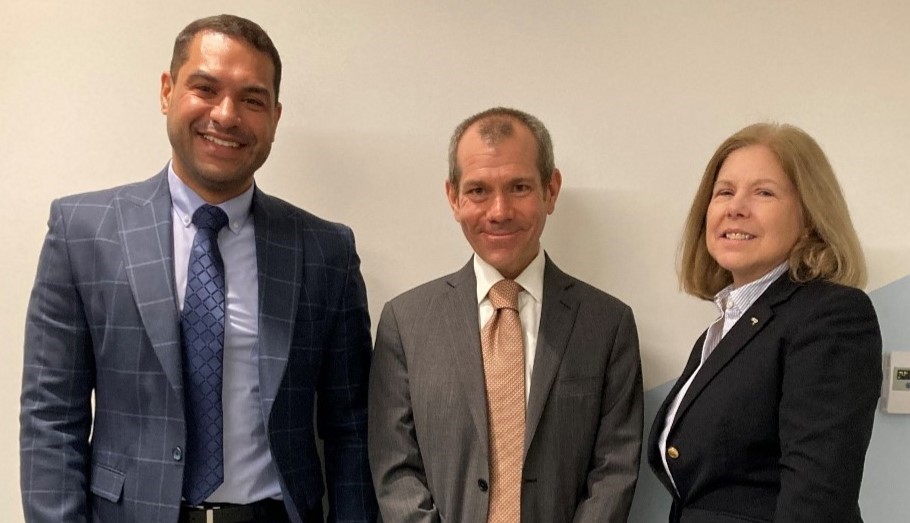Since October 2023, Wasem Gawish, D.Ph., BCPS, BCMTMS, has been working in a congressional office on Capitol Hill in Washington, D.C., as the 2023–2024 American College of Clinical Pharmacy/American Society of Health-System Pharmacists/Virginia Commonwealth University Congressional Healthcare Policy Fellow.
Gawish is serving in the office of Senator Martin Heinrich (D-NM). First elected to the Senate in 2012 after serving in the House of Representatives, Heinrich holds a position on the powerful Senate Appropriations Committee and chairs the bipartisan Senate Artificial Intelligence Caucus.
Midway through his Fellow year, Gawish sat down with ACCP staff to discuss his experience so far.
How did you first become interested in politics?
My interest in politics stemmed from a desire to make impactful changes in health care policy. I realized that policymaking is a key tool that can be used to shape and improve health outcomes. Upon meeting Dr. Kristin Zimmerman at Midyear in 2022 and learning about the ACCP/ASHP/VCU Congressional Fellowship, I knew it was the right opportunity for me and immediately applied.
How do you like living in Washington, D.C.?
Living in Washington, D.C., has been an enlightening experience. Being at the center of the nation’s political scene has allowed me to participate directly in policymaking. Not to mention, D.C. is a city brimming with museums and historical landmarks, which further enhances the enriching experience that the fellowship offers.
What has surprised you about working in a congressional office?
What has surprised me the most about working in a congressional office is the complexity of the legislative process. It demands significant collaboration, negotiation, and strategic planning. Furthermore, I was pleasantly surprised to find that policymakers highly value our real-world experience as pharmacists. The significance of our contribution to the legislative process cannot be overstated.
How much of your time do you spend working on pharmacy issues?
As a health and health AI policy fellow, a significant portion of my time is spent on pharmacy issues because it is one of the key areas in health care policy.
What are your plans for after the Fellow Program? Do you think you’ll stay in the D.C. area?
After the Fellow Program, I plan to continue working in health policy. Whether I’ll stay in the D.C. area will largely depend on where the best opportunities to make an impact are.
 Left to Right: Wasem Gawish, John McGlew, ACCP Senior Director of Government Affairs; Marcia L. Buck, ACCP Director of Clinical Practice Advancement.
Left to Right: Wasem Gawish, John McGlew, ACCP Senior Director of Government Affairs; Marcia L. Buck, ACCP Director of Clinical Practice Advancement.
Gawish spoke passionately about his work in Congress and this unique opportunity to share policy that helps improve how pharmacists take care of patients. In particular, Gawish highlighted a letter Heinrich recently sent to FDA Commissioner Robert Califf, requesting that medications for opioid use disorder (MOUD), including buprenorphine and methadone, be added to the FDA’s List of Essential Medicines. The letter specifically notes that despite the proven effectiveness of MOUD, many hospitals and EDs do not include MOUD in their formularies. This exclusion poses a significant challenge in inpatient settings, particularly for providers who need to initiate MOUD in new patients with opioid use disorder during their hospital stay. In addition, gaps in treatment through MOUD can notably increase overdose risks and fatalities. Click here to read Heinrich’s letter to the FDA.
About the Healthcare Policy Fellow Program
For almost 20 years, this prestigious program has offered a unique, year-long health care policy learning experience in the U.S. Congress. This provides pharmacists an opportunity to gain insight into health care policy analysis and development through immersion in the congressional environment. The Fellow Program begins in July with an immersive orientation in health policy across 3 weeks each with ACCP’s and ASHP’s government affairs offices, followed by 12 months on Capitol Hill.
Alumni Fellows
After serving in the program, past fellows have gone on to engage in a variety of important roles in health care policy and government:
- Amanda Ferguson, Pharm.D., the 2022–2023 fellow, served as a health policy specialist on the U.S. Senate Committee on Health, Education, Labor and Pensions (HELP).
- Tatiana Bujnoch, Pharm.D., M.S., BCPS, currently serves as Health Equity and Policy Associate at Morgan Health.
- Nimit Jindal, Pharm.D., currently serves as Senior Health Policy Advisor, U.S. Senate Committee on Health, Education, Labor and Pensions (HELP).
- Rita (Habib) Livadas, Pharm.D., currently serves as Director, Global Public Health, Life Sciences at Becton, Dickinson and Co.
Applications for the 2025–2026 Pharmacy Healthcare Policy Fellow Program
Interested candidates should visit the pharmacy Congressional Healthcare Policy Fellow program website for more information and instructions on submitting an application. For more information, click here.